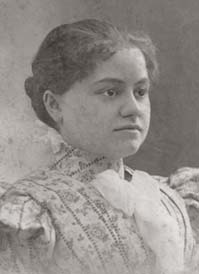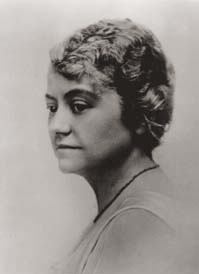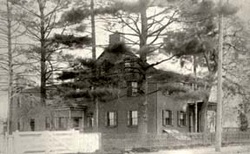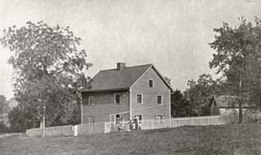Elsie Singmaster Lewars (1879-1958)
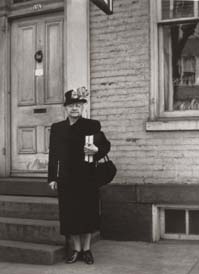
Elsie Singmaster Lewars is perhaps Macungie's most famous citizen. A descendent of the Macungie Singmasters and granddaughter of Macungie's first mayor, she became one of the nation's most prolific writers during the early decades of the 20th Century. Her stories regularly appeared in the pages of Atlantic Monthly, Century Magazine, Collier's, Ladies' Home Journal, Lippincott's Monthly Magazine, Outlook, Pictorial Review, Saturday Evening Post, Saint Nicholas Magazine, Woman's Home Companion, and Youth's Companion, as well as in numerous short story anthologies published by the major publishing houses. Born in Schuylkill Haven, Pennsylvania, on August 29, 1879, she was the daughter of the Rev. John Alden Singmaster and Caroline Hoopes Singmaster. She lived in Macungie from 1882 to 1885 while her father was pastor of Saint Matthew's Evangelical Lutheran Church, on the corner of East Main and Buttonwood Streets, in Macungie. His charge, affiliated with the Evangelical Lutheran Synod of East Pennsylvania, included five other parishes of the Lyons Charge (including Lyons, Pleasantville, Mohrsville, and Strausstown, in Berks County; and Salem Church in Upper Milford Township, Lehigh County). Elsie wrote: "It was a quiet, tree-shaded village, lying at the foot of a wooded hill which we called 'the mountain'." During this time, it is believed that she lived with her family at 165 East Main Street, in a home originally built by her great, great grandfather, John Adam Singmaster. Her earliest years of public school were spent in Macungie where her teacher spoke Pennsylvania German.
In 1887, the family left Macungie to accompany John Alden to ministry sites in Brooklyn (1887-1890) and Allentown (1890-1900), but Elsie, and her brothers James Arthur, John Howard, Edmund Hoopes, and Paul, delighted in their return to Macungie to spend summers with their parents and paternal relatives. In a 1933 autobiography, Elsie wrote: "Because of my father's affection for his home and because it was a safe place for children, we returned there for many summers, leaving first Brooklyn, New York, then Allentown, Pennsylvania, with rapture the instant that school closed on the last day of June and returning with drooping heads on the first day of September." It was during this time that the family lived in the former Wesco Baptist Meeting House located on the Singmaster farm known today as Kalmbach Memorial Park. "During a part of the time we lived in the oldest building in the neighborhood, an enlarged, weather-boarded loghouse, with darkened ceiling beams, a tremendous central chimney and many interesting traditions. Across the road, beside an ancient mill, steps were built into the race for the convenience of Baptists who had held services in the house and immersed in the race-box. A mile away there rose abruptly from the green fields one of the blast-furnaces then common in eastern Pennsylvania. It was a perfect period in our lives - the fields and streams were ours, affection and good will surrounded us." In 1900, the family moved to Gettysburg when Dr. Singmaster became a professor at the Lutheran Theological Seminary. Though she returned to the Macungie area for many visits, Elsie's home remained on the campus of the Gettysburg Seminary for the majority of her adult lifetime. She was returned to her ancestral home town of Macungie in 1958 for burial in Fairview Cemetery, where she now rests beside her parents, husband Harold Steck Lewars (d. March 1915), and their infant son, Harold Singmaster Lewars (d. May 1915).
Elsie was an 1894 graduate of Allentown High School and a 1907 Phi Beta Kappa graduate of Radcliffe College. She married Harold Lewars in April 1912 but retained Elsie Singmaster as her pen name. The fictional setting for a large portion of Singmaster local color literature about the Pennsylvania Germans was Millerstown, renamed Macungie in 1875, and many of Macungie's actual citizens became prototypes for the characters who appeared repeatedly in Singmaster stories. Her first novel, Katy Gaumer (Houghton Mifflin, 1915), was also set in Millerstown, and she reflected on those carefree days of her childhood as she told the story of three children growing up among the iron furnace, school, churches, and Sheep Stable of 19th century Macungie. Singmaster stories not only delight and entertain the reader, but also reveal Pennsylvania German and Lehigh County history, dialect, and social customs.
Elsie's greatest strength as an author was in the telling of the short story. Spanning nearly a full century, and numbering nearly 350, her stories appeared regularly in American literary journals and popular magazines beginning in 1905 and ending in the early 1940's. She also published 42 books, mainly with the New York and Boston publisher Houghton Mifflin Company. Her first short story, "The LËse-MajestÈ of Hans Heckendorn ", was published in the November 1905 issue of Scribner's Magazine; and in February 2003, her short story anthology centered around the Civil War battle of Gettysburg was published by the University of Alabama Press.
(Left) Elsie Singmaster Lewars (1948) at the Old Gettysburg Public Library
Macungie Historical Society Collection
Elsie's appeal as an author extended far beyond the boundaries of her home state of Pennsylvania. Her talent in telling delightful stories of children and young adults dealing with the challenges and moral values of a simple Pennsylvania German community also found popularity with an international audience. Her 1922 novel, Bennett Malin, was published in Great Britain during 1923 by the London publishing house of Hurst & Blackett, Ltd., and her 1929 novel, You Make Your Own Luck, found a Danish audience in the 1930 Gennen Kamp Til Sejr published in Kopenhaven by Glydendalske Boghandel-Nordisk Forlag. She also had several short stories published in London, including the children's' magazine, The Girls Own Paper, and in the Cassell and Company, Ltd. edition of The Fireside Book of Dog Stories. Focusing her writing on the Battle of Gettysburg as well as the Pennsylvania German culture, Elsie's story, The Courier of the Czar" earned a position of honor in the 1924 O. Henry Short Story Awards, and in 1934 her novel, Swords of Steel, was a Newberry Award honor book. In 1950, Elsie Singmaster was named a "Distinguished Daughter of Pennsylvania" by Governor James H. Duff. Upon publication of When Sarah Saved the Day, a juvenile novel about a brave, young Pennsylvania German farm girl who had ambitious dreams for an education, the Pennsylvania German Magazine (December 1909) wrote, "it is the first time that the Pennsylvania German people have been presented in a decent way and in a manner that does them justice." The daughter of both an English Quaker and a Pennsylvania German, Elsie identified strongly with, and throughout her lifetime remained an outspoken advocate for the capable yet misrepresented Pennsylvania Germans. As an advocate for women's education, Elsie encouraged her readers to seek self-improvement through education for the benefit of American society. Exemplifying what she asked of others, she used her skills and knowledge professionally and publicly. She was active in the Gettysburg Civic Nursing Association, the American Red Cross, the Adams County Historical Society, the Adams County Public Library System, The Women's Missionary Society, and her beloved Lutheran Church and its institutions. She took much delight in encouraging and sponsoring young men and women who showed talent and promise. Some of her Civil War stories continue to be published in contemporary collections. Her work is considered technically and historically sound and humorous, though somewhat idealistic. It is still valued for its preservation of Pennsylvania German culture, for its skillful and realistic Pennsylvania regional representation, and for its insights into another time and place in the American human experience.
In 1887, the family left Macungie to accompany John Alden to ministry sites in Brooklyn (1887-1890) and Allentown (1890-1900), but Elsie, and her brothers James Arthur, John Howard, Edmund Hoopes, and Paul, delighted in their return to Macungie to spend summers with their parents and paternal relatives. In a 1933 autobiography, Elsie wrote: "Because of my father's affection for his home and because it was a safe place for children, we returned there for many summers, leaving first Brooklyn, New York, then Allentown, Pennsylvania, with rapture the instant that school closed on the last day of June and returning with drooping heads on the first day of September." It was during this time that the family lived in the former Wesco Baptist Meeting House located on the Singmaster farm known today as Kalmbach Memorial Park. "During a part of the time we lived in the oldest building in the neighborhood, an enlarged, weather-boarded loghouse, with darkened ceiling beams, a tremendous central chimney and many interesting traditions. Across the road, beside an ancient mill, steps were built into the race for the convenience of Baptists who had held services in the house and immersed in the race-box. A mile away there rose abruptly from the green fields one of the blast-furnaces then common in eastern Pennsylvania. It was a perfect period in our lives - the fields and streams were ours, affection and good will surrounded us." In 1900, the family moved to Gettysburg when Dr. Singmaster became a professor at the Lutheran Theological Seminary. Though she returned to the Macungie area for many visits, Elsie's home remained on the campus of the Gettysburg Seminary for the majority of her adult lifetime. She was returned to her ancestral home town of Macungie in 1958 for burial in Fairview Cemetery, where she now rests beside her parents, husband Harold Steck Lewars (d. March 1915), and their infant son, Harold Singmaster Lewars (d. May 1915).
Elsie was an 1894 graduate of Allentown High School and a 1907 Phi Beta Kappa graduate of Radcliffe College. She married Harold Lewars in April 1912 but retained Elsie Singmaster as her pen name. The fictional setting for a large portion of Singmaster local color literature about the Pennsylvania Germans was Millerstown, renamed Macungie in 1875, and many of Macungie's actual citizens became prototypes for the characters who appeared repeatedly in Singmaster stories. Her first novel, Katy Gaumer (Houghton Mifflin, 1915), was also set in Millerstown, and she reflected on those carefree days of her childhood as she told the story of three children growing up among the iron furnace, school, churches, and Sheep Stable of 19th century Macungie. Singmaster stories not only delight and entertain the reader, but also reveal Pennsylvania German and Lehigh County history, dialect, and social customs.
Elsie's greatest strength as an author was in the telling of the short story. Spanning nearly a full century, and numbering nearly 350, her stories appeared regularly in American literary journals and popular magazines beginning in 1905 and ending in the early 1940's. She also published 42 books, mainly with the New York and Boston publisher Houghton Mifflin Company. Her first short story, "The LËse-MajestÈ of Hans Heckendorn ", was published in the November 1905 issue of Scribner's Magazine; and in February 2003, her short story anthology centered around the Civil War battle of Gettysburg was published by the University of Alabama Press.
(Left) Elsie Singmaster Lewars (1948) at the Old Gettysburg Public Library
Macungie Historical Society Collection
Elsie's appeal as an author extended far beyond the boundaries of her home state of Pennsylvania. Her talent in telling delightful stories of children and young adults dealing with the challenges and moral values of a simple Pennsylvania German community also found popularity with an international audience. Her 1922 novel, Bennett Malin, was published in Great Britain during 1923 by the London publishing house of Hurst & Blackett, Ltd., and her 1929 novel, You Make Your Own Luck, found a Danish audience in the 1930 Gennen Kamp Til Sejr published in Kopenhaven by Glydendalske Boghandel-Nordisk Forlag. She also had several short stories published in London, including the children's' magazine, The Girls Own Paper, and in the Cassell and Company, Ltd. edition of The Fireside Book of Dog Stories. Focusing her writing on the Battle of Gettysburg as well as the Pennsylvania German culture, Elsie's story, The Courier of the Czar" earned a position of honor in the 1924 O. Henry Short Story Awards, and in 1934 her novel, Swords of Steel, was a Newberry Award honor book. In 1950, Elsie Singmaster was named a "Distinguished Daughter of Pennsylvania" by Governor James H. Duff. Upon publication of When Sarah Saved the Day, a juvenile novel about a brave, young Pennsylvania German farm girl who had ambitious dreams for an education, the Pennsylvania German Magazine (December 1909) wrote, "it is the first time that the Pennsylvania German people have been presented in a decent way and in a manner that does them justice." The daughter of both an English Quaker and a Pennsylvania German, Elsie identified strongly with, and throughout her lifetime remained an outspoken advocate for the capable yet misrepresented Pennsylvania Germans. As an advocate for women's education, Elsie encouraged her readers to seek self-improvement through education for the benefit of American society. Exemplifying what she asked of others, she used her skills and knowledge professionally and publicly. She was active in the Gettysburg Civic Nursing Association, the American Red Cross, the Adams County Historical Society, the Adams County Public Library System, The Women's Missionary Society, and her beloved Lutheran Church and its institutions. She took much delight in encouraging and sponsoring young men and women who showed talent and promise. Some of her Civil War stories continue to be published in contemporary collections. Her work is considered technically and historically sound and humorous, though somewhat idealistic. It is still valued for its preservation of Pennsylvania German culture, for its skillful and realistic Pennsylvania regional representation, and for its insights into another time and place in the American human experience.
Note: The Macungie Historical Society library and museum maintains an extensive Singmaster family archive, including books, periodicals, photographs, letters, documents, and other related personal items and memorabilia. For more information, contact the Macungie Historical Society at 610-965-0372, or email to [email protected].
Copyright (c) 2011 by the Macungie Historical Society, Inc. All Rights Reserved.
